Current News
/ArcaMax

Why the family of 12-year-old S.C. amoeba victim wants an investigation
Clarence and Ebony Carr are seeking answers about the death of their son.
Jaysen Carr, a 12-year-old student at Hand Middle School in Columbia, South Carolina, died on July 18 from a rare infection of the Naegleria fowleri amoeba, which health officials say likely came from Lake Murray. His family hired attorney Tyler Bailey to lead an ...Read more
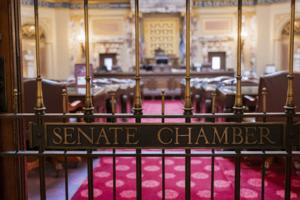
Gov. Tim Walz calls special elections for 2 vacant Senate seats
Gov. Tim Walz has called special elections in two Senate districts left vacant this month after the burglary conviction of Sen. Nicole Mitchell, DFL-Woodbury, and the death of Sen. Bruce Anderson, R-Buffalo.
Elections to fill the vacancies will take place on Nov. 4, the governor’s office announced on Tuesday. If necessary, special primary ...Read more

MN Capitol trespasser propped open door, found naked after-hours in Senate president's chair, charge says
A man found naked in the Minnesota Capitol Senate chamber late Friday was seated in the Senate president’s chair and told officers he was the governor, according to a felony charge filed Tuesday.
Minnesota State Patrol troopers arrested Dominic T. Peace, of Minneapolis, on Saturday night, after he’d been taken to the hospital twice for ...Read more
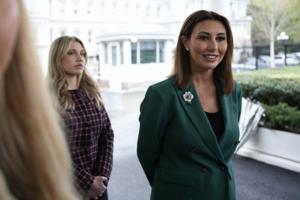
NJ criminal cases paused after challenge to top prosecutor's authority
The controversy over Alina Habba’s appointment as New Jersey’s top federal prosecutor grew this week as judges paused criminal cases amid a challenge by defendants who say she doesn’t legally hold the job.
Defendants facing narcotics charges are arguing that prosecutors can’t proceed with their case without a “validly appointed” U.S...Read more
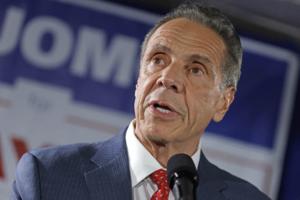
Cuomo cites NYC shooting in slamming Mamdani's 'defund the police' past
Andrew Cuomo believes Monday’s mass shooting in Midtown Manhattan will bring public safety to the forefront of this year’s mayoral race — and is already citing the tragedy in painting Democratic nominee Zohran Mamdani as someone who would be ill-equipped to oversee the NYPD.
Cuomo, who’s running as an independent against Mamdani in ...Read more

Trump administration moves to pull restrictions on oil and gas development in National Petroleum Reserve-Alaska
The Interior Department is taking additional steps to enable oil and gas drilling in the National Petroleum Reserve-Alaska, revoking Biden-era documents that called for expanding "Special Areas" that receive extra protection and are known for their unique wildlife and subsistence values.
The move continues the yearslong back-and-forth that has ...Read more

Minnesota eyes improvements to security at State Capitol, lawmakers' homes
Minnesota is considering expanding an emergency alert system for legislators and has ordered an outside review of security at the State Capitol in response to last month’s shootings of two lawmakers and a recent break-in.
The Minnesota House and Senate are also making changes amid concerns about lawmaker safety, allowing members to tap up to ...Read more
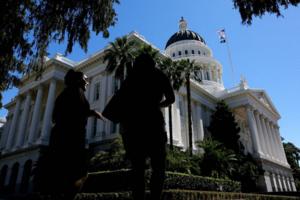
Gavin Newsom's redistricting gambit splits California Democrats
As California state lawmakers walked out of the Capitol for summer recess earlier this month, Gov. Gavin Newsom passed them a political hot potato in the form of a mid-decade redistricting proposal to counter a similar effort in Texas.
Newsom told reporters last week, after meeting with Texas Democratic lawmakers, that the California ...Read more
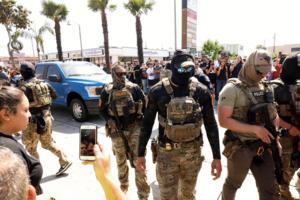
'We'll see you in court:' LA County wants to bar ICE agents from concealing identity
L.A. County took a first step Tuesday toward barring immigration officers from concealing their identities with neck gaiters and masks, though it's far from clear they'll be able to enforce the local ban on federal agents.
County supervisors voted 4-0 to ask attorneys to draft a rule that would bar all law enforcement officers — including ...Read more
News briefs
Trump hails NYPD after NYC shooting; Democrats blame lax gun laws
NEW YORK — President Donald Trump hailed the New York Police Department after the Midtown mass shooting as Democrats slammed lax gun laws for allowing the attacker to purchase the assault weapon used to kill four people including a police officer.
In between golf and a meeting...Read more
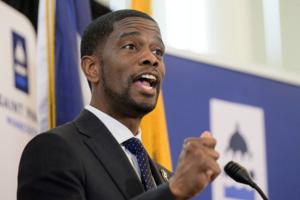
FBI, National Guard assist St. Paul as cyberattackers force shutdown of Internet-based systems
ST. PAUL, Minn. — St. Paul Mayor Melvin Carter declared a state of local emergency on Tuesday following a days-long cyberattack on the city’s Internet-based computer networks that led the city to call in the FBI and Gov. Tim Walz to enlist the aid of the Minnesota National Guard’s cybersecurity experts.
The data breach has left officials ...Read more

New York gunman, a former LA high school football player, left a note saying, 'Study my brain please'
Investigators are looking into whether a Las Vegas man who went on a deadly shooting rampage in Manhattan on Monday was targeting the National Football League after it emerged that the gunman was a Los Angeles high school football player with a documented mental health history.
New York Mayor Eric Adams said Tuesday that the shooter, identified...Read more
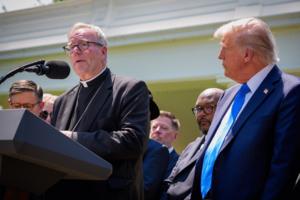
Trump administration now lets federal workers spread religion at work. Faith groups react
New guidance from President Donald Trump’s administration outlining how federal employees may engage with faith practices in the workplace garnered mixed reactions from religious groups, with some raising concern about the blurring boundary between church and state.
The guidelines, announced by the U.S. Office of Personnel Management in a ...Read more
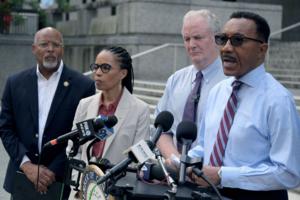
ICE defends blocking Maryland Dems from detention center, says they support dangerous migrants
The U.S. Immigration and Customs Enforcement agency on Tuesday sharply defended its decision to block Maryland members of Congress from inspecting a Baltimore detention facility and said the lawmakers are supporting migrants who “put our Maryland communities at risk.”
ICE’s response further escalated tension between Maryland Democrats and...Read more
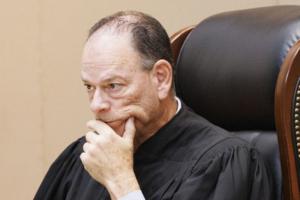
Miami's election date change 'could create chaos,' appellate court says
As a Miami mayoral candidate’s lawsuit against the city advances, Florida’s Third District Court of Appeal appeared skeptical of the city’s justification for postponing the November 2025 election to 2026 without voter approval.
A three-judge panel heard oral arguments Tuesday morning in the lawsuit that mayoral candidate and former city ...Read more
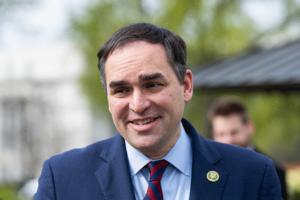
Former Rep. Wiley Nickel ends Senate bid in North Carolina after Cooper's entry
Former North Carolina Rep. Wiley Nickel dropped his Senate campaign Tuesday, one day after former Gov. Roy Cooper, a fellow Democrat, launched his bid for the open seat.
“Today, I’m suspending my campaign for Senate and proudly endorsing Roy Cooper,’’ Nickel said in a statement posted on social media.
Cooper’s entry into the race ...Read more

UConn researchers determine potential cause of Alzheimer's disease. What to know
HARTFORD, Conn. — Researchers at the UConn Center on Aging have uncovered causal links between depression and Alzheimer’s disease and related dementia (ADRD), sparking hope for potential interventions to prevent the disease.
The Alzheimer’s Association found that more than 7 million people in the country live with ADRD.
Dr. Breno Diniz, ...Read more

NYC shooter was previously arrested at Las Vegas casino
LAS VEGAS — A Las Vegas man who killed four people in Manhattan on Monday had been arrested at Red Rock Resort two years earlier.
Shane Tamura was arrested on suspicion of trespassing at the Summerlin hotel and casino, according to a Metropolitan Police Department arrest report obtained Tuesday.
A police officer was called to the casino at ...Read more

Baited camera films one of 'the world's rarest shark species' off Wales
Off the western coast of the United Kingdom, conservationists attached some bait to an underwater camera, dropped the contraption to the seabed and waited. When they eventually watched the footage, it left them stunned.
They’d filmed one of “the world’s rarest shark species.”
A team of researchers set out to investigate “dolphin ...Read more

People who lived near 2 Pa. military bases had higher level of toxic compounds in blood than US average
Bucks and Montgomery County residents who live near military bases had higher levels of four “forever chemicals” known as PFAS in their blood than the typical American, according to federal health officials.
The chemical compounds are associated with higher levels of cholesterol, which is linked to increased risk of heart disease and stroke...Read more
Popular Stories
- Republicans call Medicaid rife with fraudsters. This man sees no choice but to break the rules
- New York gunman, an LA high school football standout, left a note saying, 'Study my brain please'
- COVID rising in California. How bad will this summer be?
- 5 dead, including NYPD officer, in shooting at Park Avenue skyscraper housing Blackstone Group and NFL headquarters
- 'Tired of forcing children to duck and cover,' Gov. JB Pritzker signs two more gun control measures





